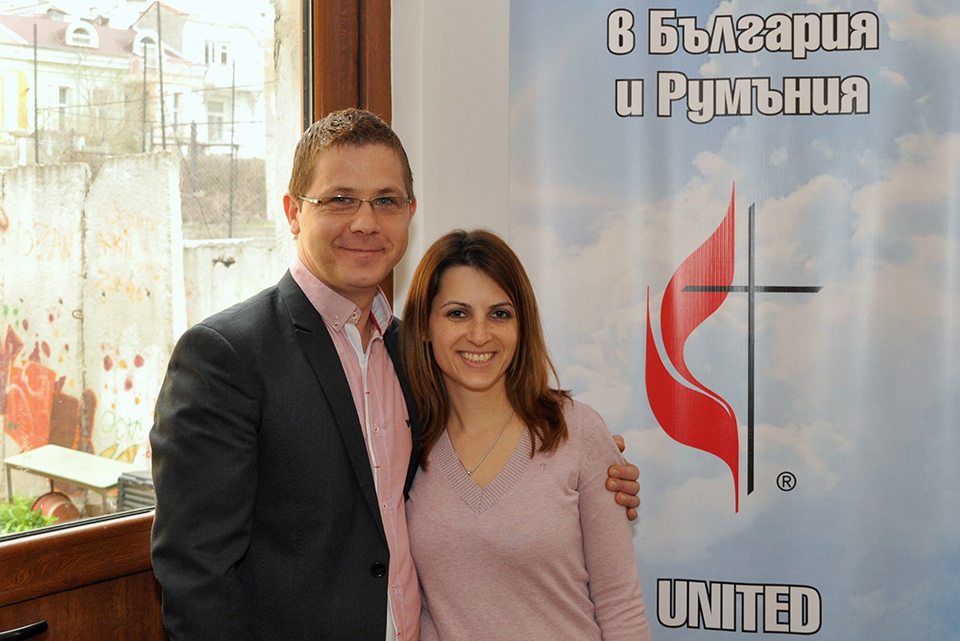Proposed amendments to Bulgaria’s Religious Denominations Act would dramatically affect whether United Methodists here could receive international support essential for churches to operate.
The proposals would also limit who the government would allow to serve as pastors.
Two amendments now in a Bulgarian Parliament committee have not yet made their way into the full body, but concerns are great that they could become law, said the Rev. Daniel G. Topalski, superintendent of the Bulgaria-Romania Conference.
“We are a country of many miracles and surprises,” said Topalski. “But, these nationalistic trends are everywhere across Europe. We are not an exception.”
Bulgaria’s Religious Confessions Law was developed after the fall of communism to guarantee religious freedom, Topalski said. He said the changes proposed would give the Religious Confessions Directorate control over donations, religious institution accreditation and education.
The law was designed to curb influence from Muslim extremists outside the country, but opponents argue that these proposals would not achieve that end. Instead, the changes would seriously curb religious practice of both Protestants and Roman Catholics, according to opponents.
Here’s how the act could directly impact United Methodists in Bulgaria, Topalski reports:
- Bulgarian United Methodist churches are part of the Central Conference of Central and Southern Europe. Churches in these 16 countries share funding, but under proposed legislation, international funding of this type would not be allowed.
- Bulgaria has 18 pastors currently serving in 27 United Methodist churches. Only pastors who have been educated in Bulgarian theological institutions, which now are all Orthodox, would be allowed under the proposal. Three current United Methodist pastors earned their graduate degrees from European seminaries outside Bulgaria. These three could be ineligible to maintain their posts.
- Partnerships with churches abroad, such as the long relationship between Main Street United Methodist church in Alton, Illinois, and the Sofia United Methodist Church, would need government approval. So would traditional mission projects, such as vacation Bible school.
- Bishop Patrick Streiff, who leads the Central and Southern Europe Conference, is from Switzerland. He would need government permission before speaking at any Bulgarian pulpit, as would any pastor from any other country. Prohibiting foreign religious leaders to speak was the practice under communism.
- Currently, the Bulgarian Orthodox Church regulates its own staff salaries and the one Muslim mosque operating in the country has its staff salaries paid for by the neighboring Turkish government. Under the proposed law, any denomination with members making up more than 1 percent of the national population would have their salaries paid by the Bulgarian state. That means Bulgarian taxes would go towards funding Orthodox and Muslim clerics. Members of Protestant, Catholic and other religions would contribute to those funds, but their churches would get no tax dollars.

Pastor Mihail Stefanov, shown here with his wife, Mirela, is one of three current United Methodist pastors in Bulgaria who were educated outside the country. Under proposed changes to the Religious Denominations Act, only pastors who have been educated in Bulgarian theological institutions could serve. Photo courtesy of The United Methodist Church in Bulgaria.
Census counts of practicing Christians may be compromised because government officials don’t understand denominational groups, Topalski said. Being Christian in Bulgaria simply means being Orthodox in the popular mindset, he added.
Establishing national United Methodist seminaries in each country across Europe is not financially feasible, and that’s why the Methodist e-Academy was developed to train European pastors online, said David Field, program coordinator of the academy. Students earn a theology degree in their home country then receive online supplemental education from United Methodist scholars.
Five Bulgarian pastors have graduated from the Methodist e-Academy, and three more are in training. Under the proposed law, their studies probably would be identified as international because the academy is sponsored by Methodist groups in the U.S. and Europe and therefore could be considered inappropriate.
“The government would not be directly licensing pastors, but the effect would be the same,” Topalski said.
The Bulgarian Evangelical Alliance — representing 12 Protestant denominations, including United Methodists — has sent a detailed formal objection to parliament arguing that the amendments violate the national constitution guaranteeing freedom of religion.
The group’s chairman, Pastor Rumen Bordzhiev, wrote in the appeal, “It is inconceivable that our registered religious institutions would be separated from the European and world body to which they belong.”
Streiff said he is meeting with the Conference of European Churches and its specialist for religious liberty to advocate for United Methodist concerns. This group supports churches from multiple Christian denominations in countries across Europe.
Bulgarian Parliament members contacted for this story have not responded to requests for comment.
“We see in this proposal an attempt to cut off the ties between the Methodist church and our wider Methodist family abroad,” Topalski said. “We are a religious minority here. It’s important that we are part of a bigger religious family, not only in finances. All these connections are crucial for our survival and ministry.”
Whitehouse is a professor of Broadcasting and Electronic Media at Eastern Kentucky University and a Fulbright Scholar studying at Sofia University in Bulgaria.
News media contact: Vicki Brown, Nashville, Tennessee, (615) 742-5470 or [email protected]. To read more United Methodist news, subscribe to the free Daily or Weekly Digests.
Like what you're reading? Support the ministry of UM News! Your support ensures the latest denominational news, dynamic stories and informative articles will continue to connect our global community. Make a tax-deductible donation at ResourceUMC.org/GiveUMCom.




